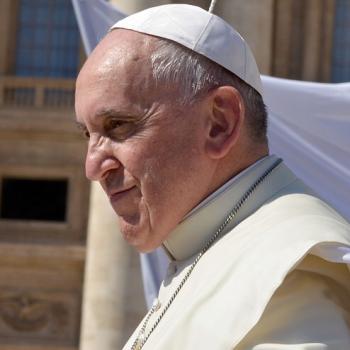
Image via Pixabay
At Catholic World Report, Dr. E. Christian Brugger has posted an article entitled “Five Serious Problems With Chapter 8 of Amoris Laetitia.” It is a long article, which my own never are; a full five thousand four hundred twelve words; longer than Chapter 8 itself. (For indeed, dear reader, I counted.)
So this will take some time to work through. Dr. Brugger’s article—unlike so many wailing panic attacks about Amoris Laetitia that can be briefly scoffed at, and refuted, and left to dry up like a raisin in the sun—is, or aims to be, analytical and scholarly. It requires care. And here I must point out that I don’t necessarily disagree with everything that Dr. Brugger says. I must separate the pro from the con.
To do all that (and since Dr. Brugger claims to have found five “serious problems” with AL) means that I will respond in five parts. I will take up these claims one post at a time.
***
For overview, here are the “serious problems” Dr. Brugger finds in Chapter 8:
- It presents an erroneous view of the role of “mitigated culpability” in pastoral care;
- It is inconsistent in its pleas to not judge others;
- It is flawed in its treatment of individual conscience;
- It insufficiently describes the moral law in terms of a “rule” and an “ideal”;
- It contradicts the Council of Trent.
Also for overview—and so the reader may have a brief sense of how much goes awry in Dr. Brugger’s article—here are a few points of my own:
- Although the actual text of AL calls for “personal and pastoral discernment,” Dr. Brugger elides this to “personal discernment”; as though the pope means for couples to engage in discernment all on their own.
- Dr. Brugger claims that AL never mentions the requirement of continence for couples in an irregular marriage; when, in fact, the pope does mention this in footnote #329.
- Dr. Brugger begins his article by praising AL for, among other things, upholding the Catholic teaching against contraception; but later, when discussing his fourth point, he claims that AL permits contraception.
- In his discussion of his second claim, Dr. Brugger quotes AL’s description of the criteria that one must apply to any act of judgment; but then proceeds to treat it as though the pope has just forbade judging altogether.
- Dr. Brugger frequently interprets entire passages of text as though they affirm what the pope expressly denies in other passages that Dr. Brugger makes no mention of at all.
I give these examples to illustrate why it is necessary to examine this article as carefully as I do. One could easily be be impressed by the weight and length of analysis Dr. Brugger provides us; and yet, it is slips like these that call his claims into question and require some time and effort to identify and point out.
***
I must commend Dr. Brugger, however, for recognizing some key strengths of Amoris Laetitia. For he does; and that is worth praising in one of the pope’s critics. I wrote a post earlier this month pointing out some passages in AL that few, I suspected, would make note of. Dr. Brugger is one of the few who do make note of them; even though his article is largely critical of AL.
- Amoris Laetitia affirms in §80 and §222 that conjugal union must be procreative. That is to say, Pope Francis upholds the teaching of Humanae Vitae on the intrinsic evil of contraception.
- It reiterates the evil of abortion in §83.
- It affirms, in §172 and 175, that every child has a right to both a mother and father, and that children need their fathers.
On this last point, Dr. Brugger points out that AL contains the lengthiest treatment of the importance of fathers of any papal document in the last fifty years. That’s remarkable; Catholics should point that out, in the pope’s praise. I am glad that Dr. Brugger does.
For an exhortation with these strengths, one should approach with caution any claim that orthodoxy has gone amiss in some later chapter. But Dr. Brugger does not stop there; he goes further; he speculates that the pope may in fact have intended heterodoxy:
Chapter 8 … allows—and seems intentionally so—for interpretations that pose serious problems for Catholic faith and practice.
This is unfortunate. The word “seems” seems to provide Dr. Brugger with an escape from any charge that he has falsely accused the pope. But give Dr. Brugger the word; how does he know this? What evidence does he have that all this is intentional? He does not say. He simply makes the claim and proceeds apace. That will not do.
***
Dr. Brugger begins his review of his first claim—that AL presents an erroneous view of “mitigated culpability”—with the following overview [his emphases vs. mine]:
Catholic moral theology has spoken about the importance of pastors being sensitive to factors limiting a penitent’s subjective guilt in order to help penitents assess their true guilt retrospectively, i.e., to help them look at what they’ve already done to assist them to judge rightly about their culpability, so they can repent and be forgiven and deal with those factors and begin freely to choose rightly.
Chapter 8 introduces a significant change in the role that mitigating factors play in pastoral care. Pastors are directed to assess subjective culpability as a way of “discerning” what kinds of ecclesial participation, including sacramental participation, are appropriate for people who are going forth from the confessional. It focuses on assessing mitigated guilt for directing prospective action leaving in place the factors that mitigate guilt, so people may continue to sin without ever becoming responsible enough to sin mortally.
So according to Dr. Brugger, the pope is saying—think about this—that pastors should identify situations of mitigated culpability; but then not help anyone to develop a fully-formed conscience. Instead they should permit people to continue sinning; they should leave malformed consciences as they found them.
Is that really so? That’s a large claim to make. I would want strong evidence of this. Dr. Brugger gives us a few examples where he thinks he finds this flaw; and I will look at them; but before I do that, I want to mention a few places that call this claim into serious question.
- First. Pope Francis’s discussion in §295 of the “law of gradualness; which Pope St. John Paul II first expounded in Familiaris Consortio 34.
Here is the definition we read in FC:
[M]an, who has been called to live God’s wise and loving design in a responsible manner, is an historical being who day by day builds himself up through his many free decisions; and so he knows, loves and accomplishes moral good by stages of growth.
So Pope Francis’s discussion is fully in keeping with the teaching of St. John Paul II. More than that, watch how he develops the thought in §295:
This is not a “gradualness of law” but rather a gradualness in the prudential exercise of free acts on the part of subjects who are not in a position to understand, appreciate, or fully carry out the objective demands of the law. For the law is itself a gift of God which points out the way, a gift for everyone without exception; it can be followed with the help of grace, even though each human being “advances gradually with the progressive integration of the gifts of God and the demands of God’s definitive and absolute love in his or her entire personal and social life.”
The pope is describing a process; but it is a process toward the “objective demands of the law.” They are “demands” and they are “objective”; God requirs them “without exception”; we can follow them “with the help of grace.” Some people just aren’t there yet; and it is not helpful to deny this, or the need for pastors to help such people along toward the good.
But it sure does not sound to me as though the pope means to say that pastors should allow people to remain as they are. The law of gradualness is not a law of stasis; and the pope does not describe it as though it is. The text says no such thing.
- Second. Pope Francis’s discussion of the “call to perfection” in §291.
Although she constantly holds up the call to perfection and asks for a fuller response to God, “the Church must accompany with attention and care the weakest of her children, who show signs of a wounded and troubled love, by restoring in them hope and confidence, like the beacon of a lighthouse in a port or a torch carried among the people to enlighten those who have lost their way or who are in the midst of a storm.” Let us not forget that the Church’s task is often like that of a field hospital.
The Church calls its members to perfection, even the weakest. The Church calls people to a fuller response to God. Pastors must work to restore the weakest among us to perfection. The pope does not say, “Let sinners remain as they are.”
One might object that, since the pope begins with the word “although,” he really means to brush aside the call to perfection. But no. For what follows “although” is simply a reminder that no one achieves perfection all at once. That’s a very sensible reminder. Pope Francis calls the Church to the work of “restoring” people with malformed consciences. To “restore” does not mean to leave people as they are. It takes time, but the pope is not describing stasis.
The pope uses three images here to illustrate what he means: a lighthouse, a torch, and a hospital. Lighthouses and torches direct people toward safety; their purpose is not to leave people in danger. Hospitals cure the wounded and the sick; they do not merely diagnose them.
I discuss several more such examples in this post from April 14.
Any discussion of the passages that Dr. Brugger cites to bolster his claims must take into consideration other passages such as those above. A document must be read consistently. You do not set one passage at odds with another or ignore passages that conflict with your interpretation of other ones. There is no school of hermeneutics that can justify that.
One might wish to say, Well, the pope is just being inconsistent. Perhaps he does so inadvertently; or perhaps he does so on purpose; but inconsistent he is.
That, however, is a separate claim and it would require its own proof. Apart from proof, one must assume that AL is consistent with itself.
***
Dr. Brugger cites two passages where he finds evidence that the pope wants pastors to leave couples in their state of diminished culpability, allow them to return to communion, and never require that they abandon grave sin.
The first of these is §300. Here is the part Dr. Brugger quotes (with my own bolding):
If we consider the immense variety of concrete situations such as those I have mentioned, it is understandable that neither the Synod nor this Exhortation could be expected to provide a new set of general rules, canonical in nature and applicable to all cases. What is possible is simply a renewed encouragement to undertake a responsible personal and pastoral discernment of particular cases, one which would recognize that, since “the degree of responsibility is not equal in all cases”, the consequences or effects of a rule need not necessarily always be the same.”
Dr. Brugger does not discuss the first block of bolded text; but we should take note of it. If the pope is not issuing any new rules, or amending canon law, it would follow that the existing law is to remain as it is. Dr. Edward N. Peters, on his Canon Law blog, noted that very thing. He writes:
To legislate for the Church popes usually employ certain types of documents (e.g., apostolic constitutions, motu proprios, ‘authentic interpretations’) or they use certain kinds of language (e.g., ‘I direct’ or ‘I approve in forma specifica’). Amoris laetitiae, an “apostolic exhortation”, is not a legislative document, it contains no legislative or authentic interpretative language, and it does not discuss Canon 915. The conclusion follows: whatever Canon 915 directed before Amoris, it directs after, including that holy Communion may not generally be administered to Catholics living in irregular marriages.
But is the pope somehow giving priests a license to ignore this law, even though it remains on the books? I am glad you asked, because the pope specifically denies that he is.
And where does he do that? I am glad you asked that too, because he does so in §300. (And that’s the very section Dr. Brugger is quoting from at the moment Only, he does not quote that part.) Here is what the pope says:
For this discernment to happen, the following conditions must necessarily be present [Discernment has conditions, the pope says.]: humility, discretion and love for the Church and her teaching, in a sincere search for God’s will and a desire to make a more perfect response to it.” These attitudes are essential for avoiding the grave danger of misunderstandings, such as the notion that any priest can quickly grant “exceptions”, or that some people can obtain sacramental privileges in exchange for favours. When a responsible and tactful person, who does not presume to put his or her own desires ahead of the common good of the Church, meets with a pastor capable of acknowledging the seriousness of the matter before him, there can be no risk that a specific discernment may lead people to think that the Church maintains a double standard.
So the pope expressly denies that priests can “grant exceptions” to Canon 915. More than that, he names the “necessary” criteria of discernment. A couple must be “responsible” and “tactful.” They must “not presume to put [their] own desires ahead of the common good of the Church.” (For “their own desires,” read “receive the Eucharist”; for “good of the Church,” read “avoid scandal.”) The pastor must “acknowledge the seriousness of the matter.” Under no circumstances may the Church “maintain a double standard.”
Dr. Brugger does not mention any of this. What he does do is latch upon the phrase “personal and pastoral discernment” (in the direct quotation) and then change it (in his own reiteration) to “personal discernment”; as though the pope is calling upon couples in irregular unions to do their own discerning. Note where Dr. Brugger first does this:
The term “pastoral discernment” is used throughout chapter 8, but its meaning is not consistent. Here it refers to the “personal discernment” of the divorced and civilly remarried. [Note the shift. AL 300 does not say “personal discernment,” singular; it says “personal and pastoral discernment,” plural.] They are encouraged to assess their own subjective culpability in order to determine what kinds of ecclesial participation are appropriate. The text says that since “the degree of responsibility is not equal in all cases”, the consequences of the “rule”—meaning consequences of violating the rule—may apply differently in different cases.
But the text I quoted above, also from §300, does not, at all, counsel Catholics to do their own discerning and decide for themselves whether to stand in line for communion. Instead, the pope says that true discernment requires a “responsible” person to “meet with a pastor.” He says that true discernment is responsive to “the common good of the Church.” He says that discernment must not lead to a “double standard.” He says that discernment must not allow priests to “make exceptions.”
In other words, whatever the pope means when he says that the consequences of a rule might not always be the same, it cannot mean what Dr. Brugger claims it to mean. He is interpreting §300 not only against other sections of Chapter 8, but against itself.
Dr. Brugger turns to a prediction:
The text will be read by many “remarried” spouses as meaning that they themselves can “discern” that, because of the complexity of their “concrete situations” (e.g., it is wrong to leave the kids and/or the new “spouse” and stressful to live as brother and sister, etc.), they themselves lack such a “degree of responsibility” as would have the consequence that they are guilty of grave sin and ought not to communicate.
Well, sure, some people might insist on reading the text that way. I doubt it nothing. But is that what the text says? If the pope expressly says that he is speaking of the kind of person “who does not presume to put his or her desires ahead of the common good of the Church,” then this hypothetical misreader that Dr. Brugger has in mind is ignoring the standards of §300. It is that person who needs correction, not the pope.
But Dr. Brugger claims that even “pastors will interpret this in conflicting ways.”
Those who are committed to traditional Catholic doctrine and practice will interpret it to mean accompanying remarried divorcees in their process of repenting for their sins, ordering their relationships according to the Gospel … and reintegrating into the sacramental life of the Church. Others, however, will interpret it to mean assisting remarried divorcees to arrive at the judgment that since they lack sufficient responsibility, nothing hinders the possibility of fuller participation, provided they go through the formality of getting their pastors to agree with their judgment.
Again, §300 specifically states the former. I don’t doubt that some priests might attempt to read into §300 the latter; but the latter is not what AL says. If one goes through all of §300, not just the parts of it Dr. Brugger quotes, he will find that the pope takes care to specify the criteria of true discernment.
Maybe we should consider the possibility that, when the pope says pastors should identify what hinders full participation in the Church, he means that as the first step in removing the hindrance, not denying it.
***
The second text that Dr. Brugger cites is from §302. Here the pope discusses what the Catechism has to say (§1735) about different factors that contribute to mitigated culpability for grave sin. This is a “sound principle of moral theology,” Dr. Brugger says; but then claims that the pope applies it “in a problematic way.” Here is the part of the text that he has in mind:
I consider very fitting what many Synod Fathers wanted to affirm: “Under certain circumstances people find it very difficult to act differently. Therefore, while upholding a general rule, it is necessary to recognize that responsibility with respect to certain actions or decisions is not the same in all cases. Pastoral discernment, while taking into account a person’s properly formed conscience, must take responsibility for these situations. Even the consequences of actions taken are not necessarily the same in all cases.”
Now, Dr. Brugger will want to claim that this last observation, about the consequences not always being the same, is specifically a reference to communion. He says:
The text implies that mature “pastoral discernment” may include acquitting individual consciences to return to Holy Communion without requiring the individuals to order their relationships according to Jesus’ teaching.
But the pope says no such thing. He is making a general observation; to assume that he has in mind a specific consequence is to read into the text something that is not there. And in fact, since the pope says earlier (in §300) that pastors can not just “grant exceptions,” it would seem evident that the pope has a different set of “consequences” in mind.
Nor does the pope say that individuals need not “order their relationships according to Jesus’ teaching.” For he specifically says, in the passage from §295 I cited above, that the moral law is an “objective demand.” God calls everyone to it, “without exception.” We can follow the moral law, the pope says, “with the help of grace.”
How could §302 “imply” what the pope denies just seven sections before? Am I to assume that Amoris Laetitia is a series of disconnected sentences that we can lift out of context and cross-examine for “implications” that are at odds with other sentences elsewhere? Is that how you read a text? Is this hermeneutics?
Dr. Brugger is very concerned, however:
But finding it “difficult to act differently” is not alone a sufficient reason not to invite remarried divorcees to extricate themselves from objective adultery. It is safe to say that most all of those who are in this situation will find it difficult to act differently. But Jesus gives us sacramental grace precisely so that we can do with his help what we find very difficult to do on our own.
No doubt. But that is the very thing the pope himself said in §295. Remember? I quote again:
For the law is itself a gift of God which points out the way, a gift for everyone without exception; it can be followed with the help of grace.
I find it curious that Dr. Brugger feels the need to inform us that Jesus gives us grace so we can follow the demands of the law; for Pope Francis just seven sections earlier tells us that Jesus gives us grace so we can follow the demands of the law.
“It is disturbing,” Dr. Brugger concludes, “that the text never mentions the universal moral obligation held and taught since the Apostles for separated spouses to abstain from non-marital intercourse.”
Actually, it does. Footnote 329. I have written about that footnote myself, both on this blog and in this article at Aleteia. Let’s go to the footnote, which we find in §298.
In such situations, many people, knowing and accepting the possibility of living “as brothers and sisters” which the Church offers them, point out that if certain expressions of intimacy are lacking, “it often happens that faithfulness is endangered and the good of the children suffers.”
I know that some have argued that this footnote gives a dismissive wave of the hand against the requirement of continence on the idea that it might threaten faithfulness and the good of the children. I go into more detail about that in my prior articles; but will say here that the fact that the pope notes that certain couples “accept” continence puts such a reading into question. Moreover, the fact that the pope says in §295 that grace is sufficient to allow everyone to follow the moral law, however far from it they might presently be, raises a further difficulty with that interpretation.
The key point is that, contrary to what Dr. Brugger claims, the pope does mention this “universal moral obligation.”
Read Part 2 here.
















